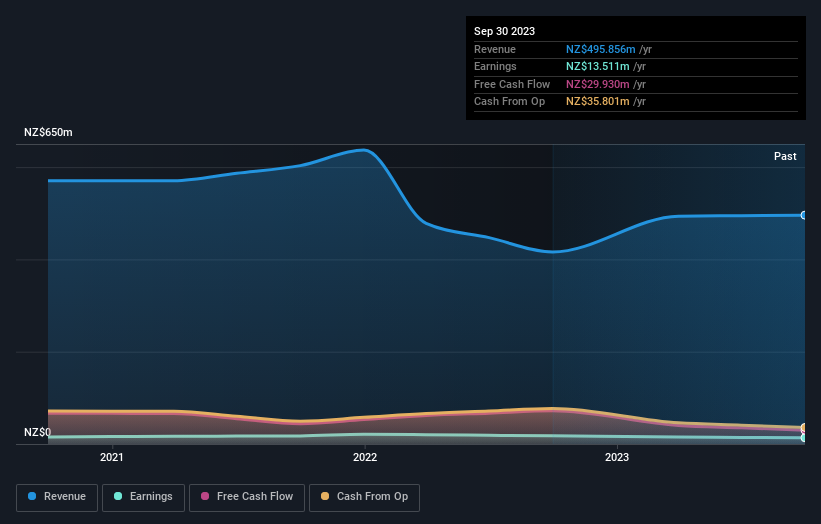- New Zealand
- /
- Food and Staples Retail
- /
- NZSE:GXH
Recent 11% pullback would hurt Green Cross Health Limited (NZSE:GXH) insiders

Key Insights
- Significant insider control over Green Cross Health implies vested interests in company growth
- A total of 2 investors have a majority stake in the company with 64% ownership
- Ownership research, combined with past performance data can help provide a good understanding of opportunities in a stock
A look at the shareholders of Green Cross Health Limited (NZSE:GXH) can tell us which group is most powerful. And the group that holds the biggest piece of the pie are individual insiders with 37% ownership. Put another way, the group faces the maximum upside potential (or downside risk).
And following last week's 11% decline in share price, insiders suffered the most losses.
Let's take a closer look to see what the different types of shareholders can tell us about Green Cross Health.
View our latest analysis for Green Cross Health

What Does The Lack Of Institutional Ownership Tell Us About Green Cross Health?
Institutional investors often avoid companies that are too small, too illiquid or too risky for their tastes. But it's unusual to see larger companies without any institutional investors.
There are multiple explanations for why institutions don't own a stock. The most common is that the company is too small relative to funds under management, so the institution does not bother to look closely at the company. It is also possible that fund managers don't own the stock because they aren't convinced it will perform well. Green Cross Health's earnings and revenue track record (below) may not be compelling to institutional investors -- or they simply might not have looked at the business closely.

We note that hedge funds don't have a meaningful investment in Green Cross Health. John Bagnall is currently the company's largest shareholder with 32% of shares outstanding. Meanwhile, the second and third largest shareholders, hold 32% and 1.1%, of the shares outstanding, respectively.
To make our study more interesting, we found that the top 2 shareholders have a majority ownership in the company, meaning that they are powerful enough to influence the decisions of the company.
While it makes sense to study institutional ownership data for a company, it also makes sense to study analyst sentiments to know which way the wind is blowing. As far as we can tell there isn't analyst coverage of the company, so it is probably flying under the radar.
Insider Ownership Of Green Cross Health
While the precise definition of an insider can be subjective, almost everyone considers board members to be insiders. Management ultimately answers to the board. However, it is not uncommon for managers to be executive board members, especially if they are a founder or the CEO.
Most consider insider ownership a positive because it can indicate the board is well aligned with other shareholders. However, on some occasions too much power is concentrated within this group.
It seems insiders own a significant proportion of Green Cross Health Limited. Insiders own NZ$60m worth of shares in the NZ$165m company. This may suggest that the founders still own a lot of shares. You can click here to see if they have been buying or selling.
General Public Ownership
The general public, who are usually individual investors, hold a 31% stake in Green Cross Health. This size of ownership, while considerable, may not be enough to change company policy if the decision is not in sync with other large shareholders.
Private Company Ownership
We can see that Private Companies own 33%, of the shares on issue. It's hard to draw any conclusions from this fact alone, so its worth looking into who owns those private companies. Sometimes insiders or other related parties have an interest in shares in a public company through a separate private company.
Next Steps:
While it is well worth considering the different groups that own a company, there are other factors that are even more important. For instance, we've identified 3 warning signs for Green Cross Health that you should be aware of.
Of course, you might find a fantastic investment by looking elsewhere. So take a peek at this free list of interesting companies.
NB: Figures in this article are calculated using data from the last twelve months, which refer to the 12-month period ending on the last date of the month the financial statement is dated. This may not be consistent with full year annual report figures.
New: Manage All Your Stock Portfolios in One Place
We've created the ultimate portfolio companion for stock investors, and it's free.
• Connect an unlimited number of Portfolios and see your total in one currency
• Be alerted to new Warning Signs or Risks via email or mobile
• Track the Fair Value of your stocks
Have feedback on this article? Concerned about the content? Get in touch with us directly. Alternatively, email editorial-team (at) simplywallst.com.
This article by Simply Wall St is general in nature. We provide commentary based on historical data and analyst forecasts only using an unbiased methodology and our articles are not intended to be financial advice. It does not constitute a recommendation to buy or sell any stock, and does not take account of your objectives, or your financial situation. We aim to bring you long-term focused analysis driven by fundamental data. Note that our analysis may not factor in the latest price-sensitive company announcements or qualitative material. Simply Wall St has no position in any stocks mentioned.
About NZSE:GXH
Green Cross Health
Provides health care and advice services to communities in New Zealand.
Good value with adequate balance sheet.
Market Insights
Community Narratives




